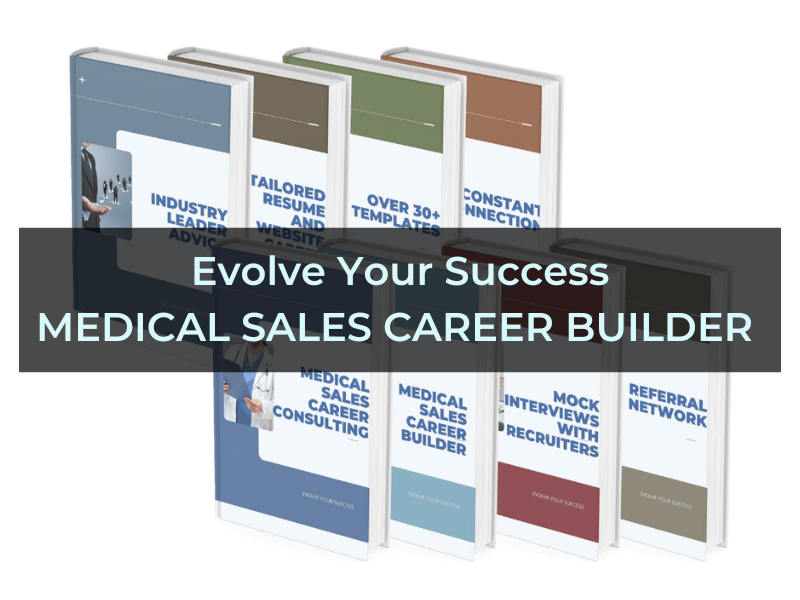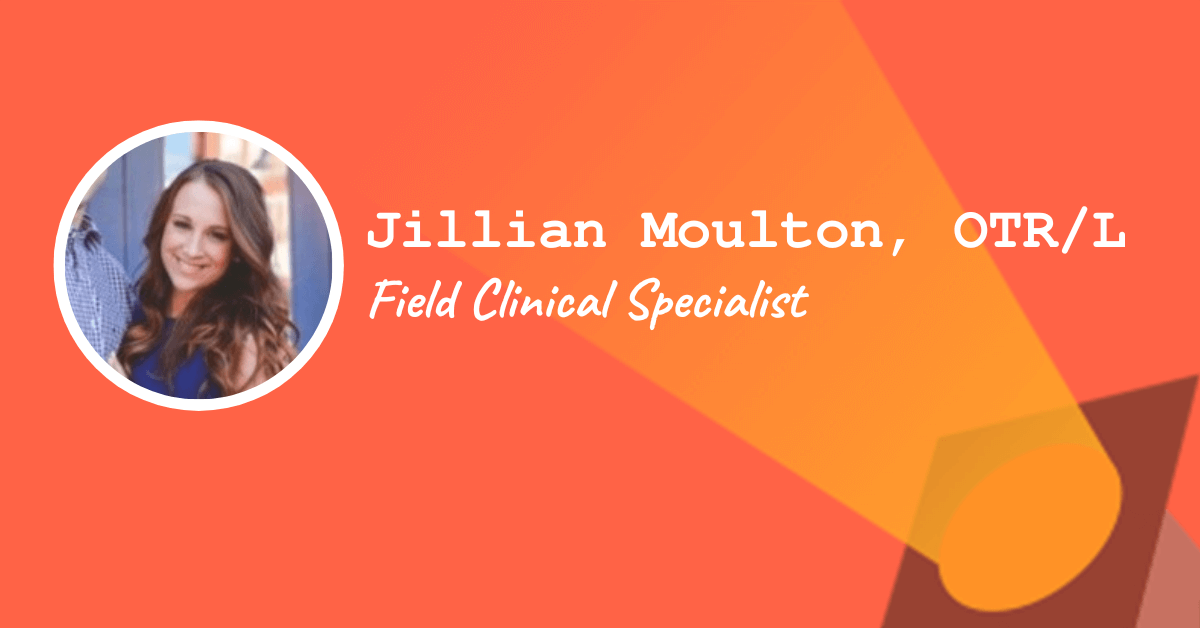This week’s spotlight is on Jillian Moulton, OTR/L, a non-clinical occupational therapist who is now Field Clinical Specialist for SPR Therapeutics!
This post may contain affiliate links or codes. This won’t increase your cost, but it helps keep TNCPT alive, and free of annoying ads! Thank you for your support. 🙂
What is your full name, title, and company name for your current, primary role?
Jillian Moulton, OTR/L — Field Clinical Specialist for SPR Therapeutics

Where are you located?
Louisville/Lexington, KY.
Where did you go to OT/A school?
I went to OTA school at Marion Technical College and then completed my Master of OT program at the University of Findlay.
Please refrain from contacting our spotlight participants on social media. There are thousands of readers just like you out there. 🙂 Please ask your questions in the comments on this blog post.
If you’re a Non-Clinical 101 student, you can network with many of our spotlight participants in the alumni groups!
What did you do when you first finished school, and for how long?
After OTA school, I primarily worked in a skilled nursing facility (SNF). After OT school, my first job was at an outpatient pediatric clinic.
In what setting(s) did you work, and what types of patients did you treat?
I worked in pretty much all settings (other than adult outpatient) between OTA/OTR, including:
- SNF
- Pediatrics
- Home health
- Birth to three
- Inpatient
- Acute care
What did you enjoy about your early roles? What didn’t you enjoy?
I really enjoyed how I felt I made a positive impact on patients’ lives! I loved getting to know my clients/patients and working with them to achieve their goals.
I also greatly valued the mentorship and collaboration that I had with the interdisciplinary teams that I was able to work with.
I didn’t enjoy feeling burnt out (Obviously! Who does, right?). I think that’s why I worked in so many different settings. I also didn’t like the productivity requirements, working weekends/holidays and the lack of growth opportunities.
When and why did you decide to do something non-clinical?
I think I always knew I would end up trying something else but wasn’t sure what. It wasn’t until I connected with other clinicians who had made the transition and realized how satisfied they were with their choice to try something new and utilize their skills in a different way.
Every therapist that I talked to who made the switch to medical device said they were glad they did. Then, I had my sons and realized that I needed a better work-life balance, so I went for it.
What are you doing these days?
I am currently working as a field clinical specialist for an amazing company called SPR Therapeutics. SPR specializes in non-opioid, minimally invasive treatment of acute and chronic pain using peripheral nerve stimulation (PNS) technology (SPRINT device).
It is a percutaneous therapy where a lead is placed near the target nerve that is connected to an external stimulator which is removable after the treatment period (60 days). We have seen amazing outcomes with pain relief for people who have suffered for years. It’s very rewarding!
Are you still treating patients, or are you solely non-clinical?
I am currently non-clinical.
How long have you been in your current field clinical specialist role?
Since February 2025.
How did you find your job? Did you apply or find it through a connection?
I networked on LinkedIn. Every interview that I got was from making connections with people who worked on the team that I was applying for.
How have people reacted to you leaving patient care?
For the most part, people have been super supportive! A lot of therapists have reached out to me to ask how I did it or what the process was like.
I think clinicians are realizing that we are not bound to just patient care in the traditional sense—there are so many options out there that are fulfilling and support professional aspirations and goals.
What’s a typical day or week in the life like for you? What types of tasks and responsibilities fill your time?
It changes day to day and week to week. It really all depends on the OR schedule and how many patients are getting implants that week. I find out my schedule the week before. I am responsible for case coverage (so being in the OR assisting with testing the stimulation) and then patient education, which happens immediately after the procedure.
When I am not in the OR, I am:
- Making phone calls to patients for check-ins
- Supporting the sales team with what they need to expand business and reach more patients/doctors
- Making sure I am staying organized with my inventory
Also, my company is very data driven, so I’m staying up to date on all the new research regarding our therapy.
What are some of the rewards of your role? What are the biggest challenges?
The rewards include definitely feeling like I am making a positive impact and difference to patients who have suffered with chronic pain—especially the elderly population who feel nothing will help them as they can’t typically undergo more intense surgeries!
A challenge for me, because I am so new, is still feeling like I have imposter syndrome—but it’s getting better! Also, sometimes there are some long days with a lot of windshield time but overall, I can’t complain!
How did your clinical background prepare you for this role? Which skills transferred?
I am so thankful for my clinical background and experience. I feel like it really helps me with engaging with patients and physicians.
As a clinician, you learn to talk to everyone and anyone because you meet so many different personalities. It has helped me connect with others, and I think that, in turn, builds trust.
Roughly speaking, how are the hours compared to patient care?
It changes week to week. I have a lot of drive time, and sometimes patients call outside of normal business hours.
What type of person do you think would do well in your field clinical specialist role?
I feel that in order to succeed and do well in this role, people would need to be organized, detail-oriented and definitely easy to talk to. You have to be approachable, as you’re collaborating with physicians and patients and troubleshooting/problem solving to ensure the best outcomes. You also have to always be (over) prepared on the day of the procedure.
Do you work remotely or onsite?
I mostly work in hospitals or clinics/surgery centers, but if there are no cases scheduled, then I work from home.
Does your organization hire PT, OT, or SLP professionals into non-clinical roles? If so, what type of roles?
Yes, there are other clinicians within SPR who are in the same role as me now and have the same background.
Did you read any books, take any courses, or do anything special overall to get you where you are today?
Yes, I am so thankful that I took the Evolve Your Success course to prepare me for a role in this industry.
Sales can feel intimidating! But confidence comes from talking the talk and knowing you’re prepared to walk the walk. It’s much easier to sell yourself in interviews when you’ve gone through formal sales training. We highly recommend upskilling and working with the sales mentors at Evolve Your Success.
Their Medical Sales Career Builder program has a 100% satisfaction rating and 90% placement record! Mention that The Non-Clinical PT sent you to get $800 off!

What is a typical career path for someone in your field clinical specialist role?
Depending on your aspirations, there are many different roles you can take. You can work up as a senior field clinical specialist. I have also heard of others transitioning into a more sales-focused role after being a clinical specialist for a few years.
What is next for you? What are your high-level career aspirations?
I see myself continuing on to be a senior field clinical specialist or working in a sales-rep role down the road.
What would you recommend to someone who is considering going into a role like yours? Do you have any special words of wisdom for the readers?
Network as much as you can…like it’s your job! People want to help, and in this industry specifically, people really enjoy answering questions and giving insight into the day-to-day life.
Like I mentioned earlier, any interview I got was from networking—not just submitting a resume alone!
Also, make sure you know what you want to do, and don’t just jump into the first non-clinical role that you see or that someone tells you that you may be good at. There are so many options and opportunities.
What would you teach to today’s graduate students in your profession, if you had the opportunity?
I would remind them that it’s okay to pivot and that you are not tied to being a clinician in the traditional sense your whole career.
You will have invested a lot of time, money and effort into becoming a clinician, and you get to steer the ship!
Do you have any special advice for others who want to follow in your footsteps as a field clinical specialist?
I am always willing to answer questions and help. It’s a really big step and can be scary (it was for me) at first. It’s always nice to talk to someone who’s done it and will give honest feedback. I want to pay it back and do what others did for me.




